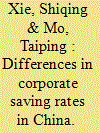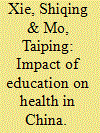| Srl | Item |
| 1 |
ID:
143431


|
|
|
|
|
| Summary/Abstract |
Using the data of the listed non-financial companies from 2003 to 2012, this paper conducts a firm-level empirical analysis to reveal the determinants that lead to differences in saving rates of different enterprises in China. Particularly, we explore the discrepancies in the Chinese enterprises' saving rates from the new perspectives of ownership type, monopoly status, and financial development. We find that only some financial indicators of a firm, including the size and the long-term solvency ability, have direct impact on its saving rate. Besides, the difference in the saving rates between private firms and state-owned firms is insignificant while monopolies have higher saving rates than non-monopolies. Most importantly, financial development generally reduces a firm's saving rate and the impact is independent on its ownership type and monopoly status. Moreover, financial development decreases the influence of a firm's short-term solvency and profitability on its saving rate.
|
|
|
|
|
|
|
|
|
|
|
|
|
|
|
|
| 2 |
ID:
133181


|
|
|
|
|
| Publication |
2014.
|
| Summary/Abstract |
In this paper, we investigate the causal effect of education on health using an instrumental variable approach. The instruments we employ consist of two institutional changes in China that generated discontinuities in educational attainment among individuals. To ensure the validity of the instruments and obtain prudent conclusions, we adopt more restrictive identification tests than previous studies. The results indicate no causal impact of education on either perceived health or anthropometric health. With regard to the impact of education on male health behavior, namely smoking, we cannot provide conclusive results due to a violation of the exogeneity of our instruments. Nevertheless, we can confirm that education has no causal effect on female health behavior. To overcome the widely documented shortage of quasi-experimental identification, we also employ spouse's education as an alternative instrument to examine the causal effect of education. Identical results are obtained, with the exception that the impact of education on the reduction of overweight among women becomes significant. We conclude that this provides some evidence of a causal impact of education on health.
|
|
|
|
|
|
|
|
|
|
|
|
|
|
|
|